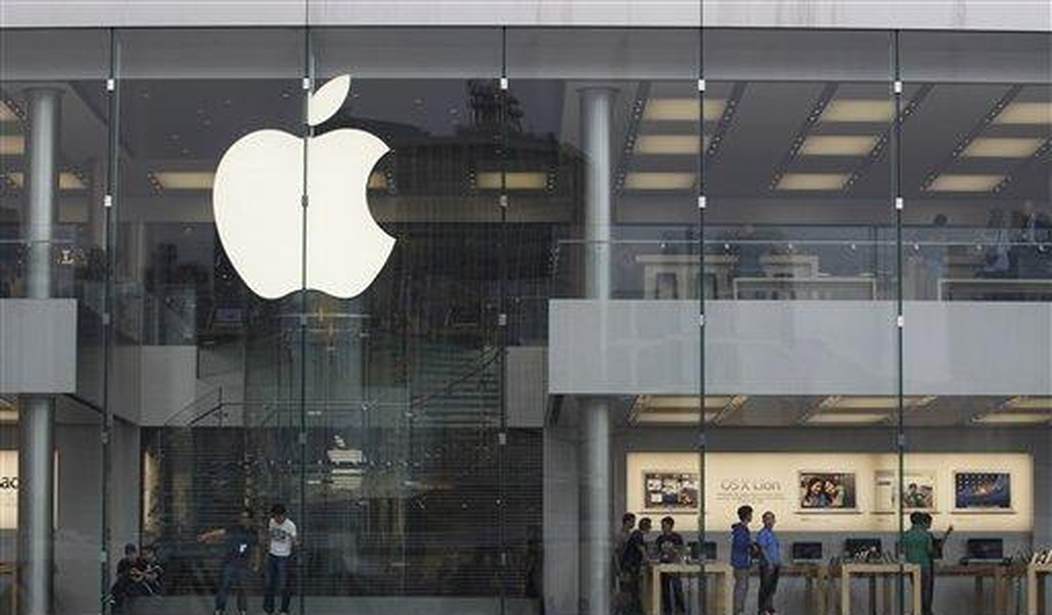Finally: Tim Cook's Apple is being heavily scrutinized for violating users' privacy.
This week, France's privacy watchdog recommended that the company receive a $6.3 million fine for breach of privacy rules, while last month here in the U.S., Apple became subject to a proposed federal class action lawsuit for recording users' mobile activity without their consent.
Apple claims that it thinks privacy is a human right, but it certainly doesn’t act like it believes so. As Ian Bogost at The Atlantic once put it, “Tim Cook talks a big game, but at the end of the day, his company is allowing the surveillance-capitalism atrocities it claims to oppose. It sometimes helps people find alternatives in its own services, but far more often, it fails to prevent its customers from being harmed by companies such as Google and Facebook—in part because it provides, endorses, and profits from their use.”
The American people have every reason to hate Apple and Big Tech. These rogue digital monopolists have proven time and time again that they don't care about us. But while we should demonize them, regulate them, and maybe even break them up, one thing we should never do is cede more control of user privacy to the federal government.
I'm sure some bureaucrats in Washington, D.C. — which never let a good crisis go to waste — would love to use this moment to increase the amount of data that falls into Big Brother's hands. But the government is a lot like Scrappy Doo. It believes it can do everything, but the reality is that it can do next to nothing — at least well. Protecting user privacy is no exception. In fact, there is no worse guardian of user data today than the U.S. federal government.
We only have to rewind to September to find the most recent government privacy horror story. That's when the IRS disclosed to Homeland Security Committee Chairman Bennie Thompson that it inadvertently divulged 120,000 Americans' private information online, including their full names and contact information. It's bad that this issue — which took weeks for the IRS even to realize occurred — at an agency whose most basic responsibility is to protect user data, but it's not the first time, either. Privacy violations often happen at the IRS — in fact, it was just years ago when over 100,000 Americans' private data got swept up in a hacking expedition.
Recommended
The federal government's Office of Personnel Management, which runs USAJobs.gov — the government website for public sector job opportunities — is another winner when it comes to privacy protection.
On the July 2022 Federal Information Technology Acquisition Reform Act (FITARA) scorecard, the OPM received an F for cybersecurity. That didn't surprise anyone familiar with the significant security flaws the OPM has experienced throughout its existence, which culminated in a judge-settled $63 million settlement in October for the most significant breach in government history that occurred on its watch, affecting over 21 million Americans.
Compare the OPM's abysmal track record with the glowing records of private sector companies that also manage employment listings for the federal government, like Monster Government Solutions (MonsterGov), and the truth becomes clear as day. Less of the public sector is more, especially when it comes to privacy protection.
Companies like Apple may be bad in this space, but they will never be as bad as Uncle Sam.
As the Institute for Policy Innovation put it, even the worst private offenders (like Apple) have every reason to improve their privacy practices. They are "swarmed by sanctions if they invade privacy or fail to adopt proper security procedures" and face the grim prospect of legal action or customers choosing to do business elsewhere if their information practices remain too invasive or objectionable. Governments, on the other hand, "are relatively indifferent to privacy. They lumber forward whether or not their actions are in tune with the privacy preferences of citizens."
Rather than give the government more powers, let's use it for what it's good at — beating, penalizing, and regulating anti-consumer actors like Apple. And instead of mulling giving failed Washington privacy cops even more authority, perhaps we as a society should begin to think long and hard about whether it's time to boycott Big Tech giants like this one or stop doing business with them altogether. We will all be better off as a result.

























Join the conversation as a VIP Member